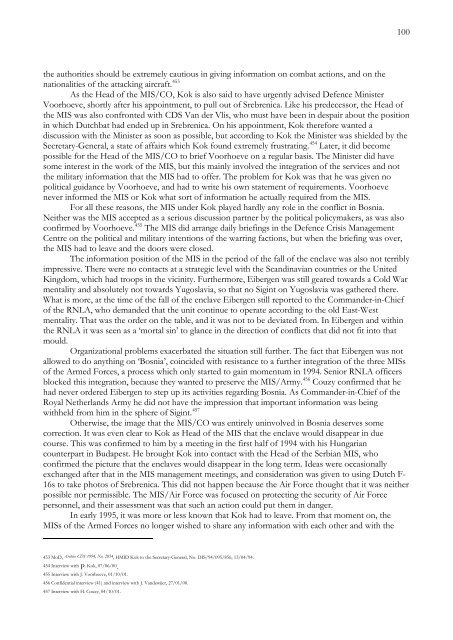C. Wiebes - Intelligence en de oorlog in Bosnië 1992-1995. De rol van de inlichtingen- en veiligheidsdiensten - Engels
C. Wiebes - Intelligence en de oorlog in Bosnië 1992-1995. De rol van de inlichtingen- en veiligheidsdiensten - Engels
C. Wiebes - Intelligence en de oorlog in Bosnië 1992-1995. De rol van de inlichtingen- en veiligheidsdiensten - Engels
- No tags were found...
You also want an ePaper? Increase the reach of your titles
YUMPU automatically turns print PDFs into web optimized ePapers that Google loves.
100the authorities should be extremely cautious <strong>in</strong> giv<strong>in</strong>g <strong>in</strong>formation on combat actions, and on th<strong>en</strong>ationalities of the attack<strong>in</strong>g aircraft. 453As the Head of the MIS/CO, Kok is also said to have urg<strong>en</strong>tly advised <strong>De</strong>f<strong>en</strong>ce M<strong>in</strong>isterVoorhoeve, shortly after his appo<strong>in</strong>tm<strong>en</strong>t, to pull out of Srebr<strong>en</strong>ica. Like his pre<strong>de</strong>cessor, the Head ofthe MIS was also confronted with CDS Van <strong>de</strong>r Vlis, who must have be<strong>en</strong> <strong>in</strong> <strong>de</strong>spair about the position<strong>in</strong> which Dutchbat had <strong>en</strong><strong>de</strong>d up <strong>in</strong> Srebr<strong>en</strong>ica. On his appo<strong>in</strong>tm<strong>en</strong>t, Kok therefore wanted adiscussion with the M<strong>in</strong>ister as soon as possible, but accord<strong>in</strong>g to Kok the M<strong>in</strong>ister was shiel<strong>de</strong>d by theSecretary-G<strong>en</strong>eral, a state of affairs which Kok found extremely frustrat<strong>in</strong>g. 454 Later, it did becomepossible for the Head of the MIS/CO to brief Voorhoeve on a regular basis. The M<strong>in</strong>ister did havesome <strong>in</strong>terest <strong>in</strong> the work of the MIS, but this ma<strong>in</strong>ly <strong>in</strong>volved the <strong>in</strong>tegration of the services and notthe military <strong>in</strong>formation that the MIS had to offer. The problem for Kok was that he was giv<strong>en</strong> nopolitical guidance by Voorhoeve, and had to write his own statem<strong>en</strong>t of requirem<strong>en</strong>ts. Voorhoev<strong>en</strong>ever <strong>in</strong>formed the MIS or Kok what sort of <strong>in</strong>formation he actually required from the MIS.For all these reasons, the MIS un<strong>de</strong>r Kok played hardly any <strong>rol</strong>e <strong>in</strong> the conflict <strong>in</strong> Bosnia.Neither was the MIS accepted as a serious discussion partner by the political policymakers, as was also455confirmed by Voorhoeve. The MIS did arrange daily brief<strong>in</strong>gs <strong>in</strong> the <strong>De</strong>f<strong>en</strong>ce Crisis Managem<strong>en</strong>tC<strong>en</strong>tre on the political and military <strong>in</strong>t<strong>en</strong>tions of the warr<strong>in</strong>g factions, but wh<strong>en</strong> the brief<strong>in</strong>g was over,the MIS had to leave and the doors were closed.The <strong>in</strong>formation position of the MIS <strong>in</strong> the period of the fall of the <strong>en</strong>clave was also not terriblyimpressive. There were no contacts at a strategic level with the Scand<strong>in</strong>avian countries or the UnitedK<strong>in</strong>gdom, which had troops <strong>in</strong> the vic<strong>in</strong>ity. Furthermore, Eiberg<strong>en</strong> was still geared towards a Cold Warm<strong>en</strong>tality and absolutely not towards Yugoslavia, so that no Sig<strong>in</strong>t on Yugoslavia was gathered there.What is more, at the time of the fall of the <strong>en</strong>clave Eiberg<strong>en</strong> still reported to the Comman<strong>de</strong>r-<strong>in</strong>-Chiefof the RNLA, who <strong>de</strong>man<strong>de</strong>d that the unit cont<strong>in</strong>ue to operate accord<strong>in</strong>g to the old East-Westm<strong>en</strong>tality. That was the or<strong>de</strong>r on the table, and it was not to be <strong>de</strong>viated from. In Eiberg<strong>en</strong> and with<strong>in</strong>the RNLA it was se<strong>en</strong> as a ‘mortal s<strong>in</strong>’ to glance <strong>in</strong> the direction of conflicts that did not fit <strong>in</strong>to thatmould.Organizational problems exacerbated the situation still further. The fact that Eiberg<strong>en</strong> was notallowed to do anyth<strong>in</strong>g on ‘Bosnia’, co<strong>in</strong>ci<strong>de</strong>d with resistance to a further <strong>in</strong>tegration of the three MISsof the Armed Forces, a process which only started to ga<strong>in</strong> mom<strong>en</strong>tum <strong>in</strong> 1994. S<strong>en</strong>ior RNLA officersblocked this <strong>in</strong>tegration, because they wanted to preserve the MIS/Army. 456 Couzy confirmed that hehad never or<strong>de</strong>red Eiberg<strong>en</strong> to step up its activities regard<strong>in</strong>g Bosnia. As Comman<strong>de</strong>r-<strong>in</strong>-Chief of theRoyal Netherlands Army he did not have the impression that important <strong>in</strong>formation was be<strong>in</strong>gwithheld from him <strong>in</strong> the sphere of Sig<strong>in</strong>t. 457Otherwise, the image that the MIS/CO was <strong>en</strong>tirely un<strong>in</strong>volved <strong>in</strong> Bosnia <strong>de</strong>serves somecorrection. It was ev<strong>en</strong> clear to Kok as Head of the MIS that the <strong>en</strong>clave would disappear <strong>in</strong> duecourse. This was confirmed to him by a meet<strong>in</strong>g <strong>in</strong> the first half of 1994 with his Hungariancounterpart <strong>in</strong> Budapest. He brought Kok <strong>in</strong>to contact with the Head of the Serbian MIS, whoconfirmed the picture that the <strong>en</strong>claves would disappear <strong>in</strong> the long term. I<strong>de</strong>as were occasionallyexchanged after that <strong>in</strong> the MIS managem<strong>en</strong>t meet<strong>in</strong>gs, and consi<strong>de</strong>ration was giv<strong>en</strong> to us<strong>in</strong>g Dutch F-16s to take photos of Srebr<strong>en</strong>ica. This did not happ<strong>en</strong> because the Air Force thought that it was neitherpossible nor permissible. The MIS/Air Force was focused on protect<strong>in</strong>g the security of Air Forcepersonnel, and their assessm<strong>en</strong>t was that such an action could put them <strong>in</strong> danger.In early 1995, it was more or less known that Kok had to leave. From that mom<strong>en</strong>t on, theMISs of the Armed Forces no longer wished to share any <strong>in</strong>formation with each other and with the453 MoD, Archive CDS 1994, No. 2854, HMID Kok to the Secretary-G<strong>en</strong>eral, No. DIS/94/095/856, 13/04/94.454 Interview with P . Kok, 07/06/00 .455 Interview with J. Voorhoeve, 01/10/01.456 Confid<strong>en</strong>tial <strong>in</strong>terview (41) and <strong>in</strong>terview with J. Van<strong>de</strong>wijer, 27/01/00.457 Interview with H. Couzy, 04/10/01.





